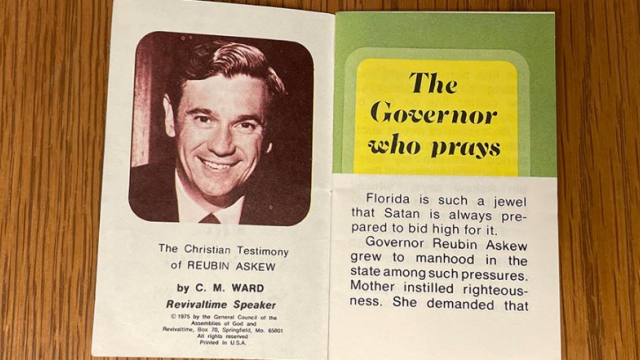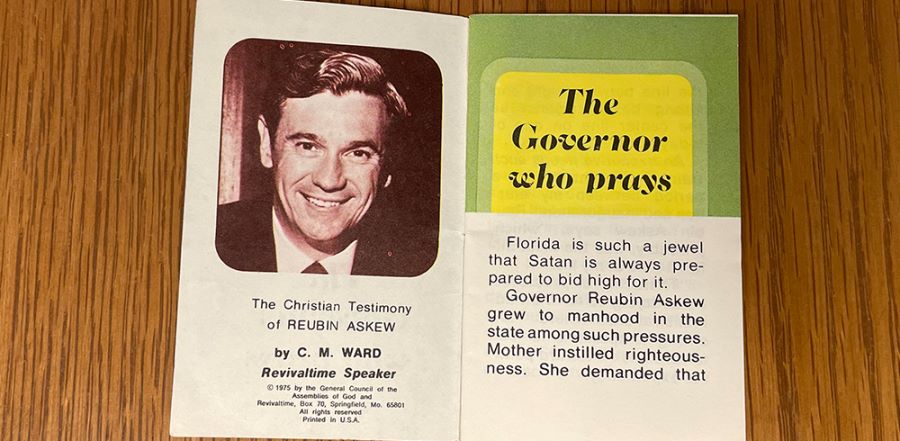
C. M. Ward Interviews Florida Governor Reubin Askew: An Example of Integrity During Political Scandals

This Week in AG History —July 13, 1975
By Ruthie Edgerly Oberg
Originally published on AG News, 14 July 2022
Charles Morse Ward (1909-1996) is known in the Assemblies of God as a great preacher but he was also one of its most prolific writers. His role as the speaker of the radio program, Revivaltime, provided a platform for printing of sermons, tracts, booklets, and interviews. He previously served as editor of The Pentecostal Testimony, the official publication of the Pentecostal Assemblies of Canada, and he also wrote columns for the local newspaper when pastoring in Bakersfield, California.
Ward’s published interviews on a diverse range of characters, including Colonel Sanders, of restaurant fame. He interviewed scientists, professors, hotel magnates, journalists, businessmen, astronauts, and a circus ringmaster for the Revivaltime tract series.
In the July 13, 1975, issue of The Pentecostal Evangel, Lee Shultz, radio announcer for Revivaltime, reported on Ward’s interview with Reubin Askew (1928-2014), who had just been reelected to his second term as governor of Florida. The race took place during the height of the Nixon Watergate scandal and distrust of government officials was high.
Born in Muskogee, Oklahoma, Askew’s parents divorced when he was just 2, due primarily to his father’s struggles with alcohol. He never saw his father after age 10 and his mother struggled to raise six children alone through the Great Depression, moving to Pensacola, Florida, in 1937. Askew sold magazines, shined shoes, bagged groceries, and sold his mother’s homemade pies to help supplement his mother’s income as a waitress and seamstress. His mother insisted that he attend church and instilled a love for righteousness that would serve him well.
After graduating from high school in 1946, Askew served as an army paratrooper and then as an intelligence officer in the Air Force during the Korean War. After earning a law degree from the University of Florida, he married Donna Harper in 1956 and won election to the Florida House of Representatives in 1958. He then served in the Florida Senate and in 1970 was elected governor on the Democratic ticket.
Askew, along with Jimmy Carter, was one of the first of the “New South” governors and supported school desegregation, intentionally helping black Floridians to re-enter the political system a short time after the passage of the Voting Acts Right of 1965. He appointed the first African-American to a state government position since Reconstruction, the first African-American to hold a cabinet level office in modern Florida history. He also named the first African-American state supreme court justice at a time when this was not politically expedient.
In Ward’s interview with Askew, the governor highlighted the high importance of prayer in his personal life: “I went through a period between my election and inauguration which probably was the most difficult time of my life. There were pressures. I was trying to form an administration. There are strong temptations to lean toward flesh — toward political expediency. I needed help, and I found help at the Throne. Prayer had always been a very important part of my life. I prayed more earnestly about what to do and how to do it. I would not attempt the burdens of this office without a relationship with Jesus Christ.”
When Ward asked about the political climate of 1975, Askew responded that it had become “a heavy, spiritual burden” that credibility be restored to every level of government. He said that the challenge for our nation in this hour “isn’t finding those with innate ability to provide answers. It is, rather, finding those with strong convictions, willing to seek answers.”
Governor Askew worked hard to live up to his standard of transparency in governing and leading by example. By all accounts, his marriage was a happy one and, unlike his father, he remained faithful to his wife throughout their marriage, leading both of his children to Christ at an early age. Throughout his life, Askew refrained from smoking, drinking, swearing, and gambling.
Askew was a member of a Presbyterian church. However, Ward believed that everyone, regardless of religious affiliation, could benefit from Askew’s example of a faithful public servant in the midst of an era of political crisis.
When Askew died in 2014, it was remarked that at a time of government scandals he established a reputation for personal integrity. His nickname around the statehouse was “Reubin the Good.” While that moniker began as cynical and derisive, one of his political opponents admitted that “he has established a kind of morality in office that causes people to have faith in government.”
At his death, Askew was ranked by the Tampa Bay Times as the second-best governor in Florida history. The John F. Kennedy School of Government at Harvard University rated him one of the top 10 governors of the 20th century.
But C.M. Ward gave him an even higher honor: “I saw Jesus in this man.”
Read Lee Shultz’s article, “When the Governor Talked, the Park Became a Chapel” on page 20 of the July 13, 1975, issue of the Pentecostal Evangel and the expanded interview on “The Governor Who Prays,” a Revivaltime miniature tract.
Also featured in this issue:
• “Nothing Short of a Miracle” by Samuel M. Buick
• “Marks of the Millennium” by Ian McPherson
And many more!
Click here to read this issue now.
Pentecostal Evangel archived editions courtesy of the Flower Pentecostal Heritage Center.
Do you have Pentecostal historical materials that should be preserved? Please consider depositing these materials at the Flower Pentecostal Heritage Center (FPHC). The FPHC, located in the Assemblies of God national offices, is the largest Pentecostal archive in the world. We would like to preserve and make your treasures accessible to those who write the history books.
Flower Pentecostal Heritage Center
1445 North Boonville Avenue
Springfield, Missouri 65802 USA
Phone: 417.862.1447 ext. 4400
Toll Free: 877.840.5200
Email: [email protected]
Website: www.iFPHC.org












Leave a Reply